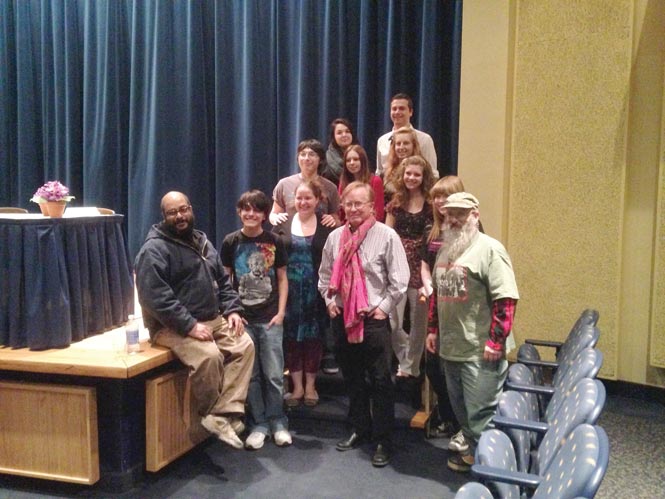‘Flowers are better than bullets’ – Diverse panel of student organizations discusses how to achieve peace
November 20, 2013
Editor’s note: This story has been corrected to accurately attribute a statement to Kornecki.
A diverse group of student organizations came together Tuesday in the Kiva to discuss strategies for achieving peace during the May 4 Task Force Fall Forum. The program, entitled “Flowers are Better than Bullets,” featured a panel of representatives from five student groups that advocate for peace.
The panel consisted of Victoria Humphreys, senior communication studies major from the Native American Student Association; Krystyna Kornecki, graduate geology appointee from Students for Justice in Palestine; Ephraim Butler, sophomore Pan-African studies major and Black United Students director of political affairs and grievances; Lindsey Speyer, senior sociology major from Hillel at Kent State, and Corissa Gay, senior English major from the May 4 Task Force.
John Hess, sophomore political science major and moderator for the forum, opened with a brief history of the events that occurred at Kent State on May 4, 1970, when four students died protesting the war in Vietnam.
“These were people like us,” Hess said. “College students who had gathered together to protest and advocate for peace.”
The forum drew its theme from a quote by Allison Krause, one of the victims of the May 4 shooting.
“What’s the matter with peace? Flowers are better than bullets,” she reportedly said after giving a flower to a National Guard member during the protest.
Each representative discussed their organizations’ stance on questions related to achieving peace and effects of violence on different cultures.
“Flowers are better than bullets,” Humphreys said. “But I also believe that words can be even stronger and can have a long lasting impression.”
Recalling the long history of violence against Native Americans, Humphreys said that even today her people struggle with the government. She explained her experience advocating for other Native Americans and the effectiveness of peaceful words to bring about change.
Butler recognized while words and advocating for peace is effective, people also need to be prepared to deal with those who would chose to use bullets.
“It’s important to recognize that mindset of striving for peace and wanting to maintain an environment in which you don’t have so much hatred,”
Butler said. “Sometimes you have to be able to defend yourself and always keep that peaceful mindset and not attack from being defensive.”
The panel also addressed the questions of “Is peace more than just the absence of war?” and “Does peaceful activism actually bring about change?”
Each panel member touched on the effectiveness of the media in carrying the message to the public. Kornecki expressed her frustration that most Americans only hear about Palestine in negative connotations and war metaphors.
“It’s really frustrating and heartbreaking to me,” she said. “I feel that all we can do is promote peaceful activism.”
Each organization provided upcoming opportunities for students to get involved as a step to achieving peace and encourages students to visit each groups’ Facebook pages to learn more about getting involved.
Contact Matthew Merchant at [email protected].












